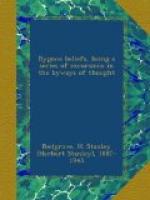[1] ELIHU RICH: The Occult Sciences, p. 346.
[2] I may refer the reader to my A Mathematical Theory of Spirit (1912), chap. i., for a more adequate statement.
[1b] ELIPHAS LEVI: Transcendental Magic: its Doctrine and Ritual (trans. by A. E. WAITE, 1896), p. 234.
VII
CEREMONIAL MAGIC IN THEORY AND PRACTICE
THE word “magic,” if one may be permitted to say so, is itself almost magical—magical in its power to conjure up visions in the human mind. For some these are of bloody rites, pacts with the powers of darkness, and the lascivious orgies of the Saturnalia or Witches’ Sabbath; in other minds it has pleasanter associations, serving to transport them from the world of fact to the fairyland of fancy, where the purse of FORTUNATUS, the lamp and ring of ALADDIN, fairies, gnomes, jinn, and innumerable other strange beings flit across the scene in a marvellous kaleidoscope of ever-changing wonders. To the study of the magical beliefs of the past cannot be denied the interest and fascination which the marvellous and wonderful ever has for so many minds, many of whom, perhaps, cannot resist the temptation of thinking that there may be some element of truth in these wonderful stories. But the study has a greater claim to our attention; for, as I have intimated already, magic represents a phase in the development of human thought, and the magic of the past was the womb from which sprang the science of the present, unlike its parent though it be.
What then is magic? According to the dictionary definition—and this will serve us for the present—it is the (pretended) art of producing marvellous results by the aid of spiritual beings or arcane spiritual forces. Magic, therefore, is the practical complement of animism. Wherever man has really believed in the existence of a spiritual world, there do we find attempts to enter into communication with that world’s inhabitants and to utilise its forces.Professor LEUBA[1] and others distinguish between propitiative behaviour towards the beings of the spiritual world, as marking the religious attitude, and coercive behaviour towards these beings as characteristic of the magical attitude; but one form of behaviour merges by insensible degrees into the other, and the distinction (though a useful one) may, for our present purpose, be neglected.
[1] JAMES H. LEUBA: The Psychological Origin and the Nature of Religion (1909), chap. ii.
Animism, “the Conception of Spirit everywhere” as Mr EDWARD CLODD[2] neatly calls it, and perhaps man’s earliest view of natural phenomena, persisted in a modified form, as I have pointed out in “Some Characteristics of Mediaeval Thought,” throughout the Middle Ages. A belief in magic persisted likewise. In the writings of the Greek philosophers of the Neo-Platonic school, in that curious body of




